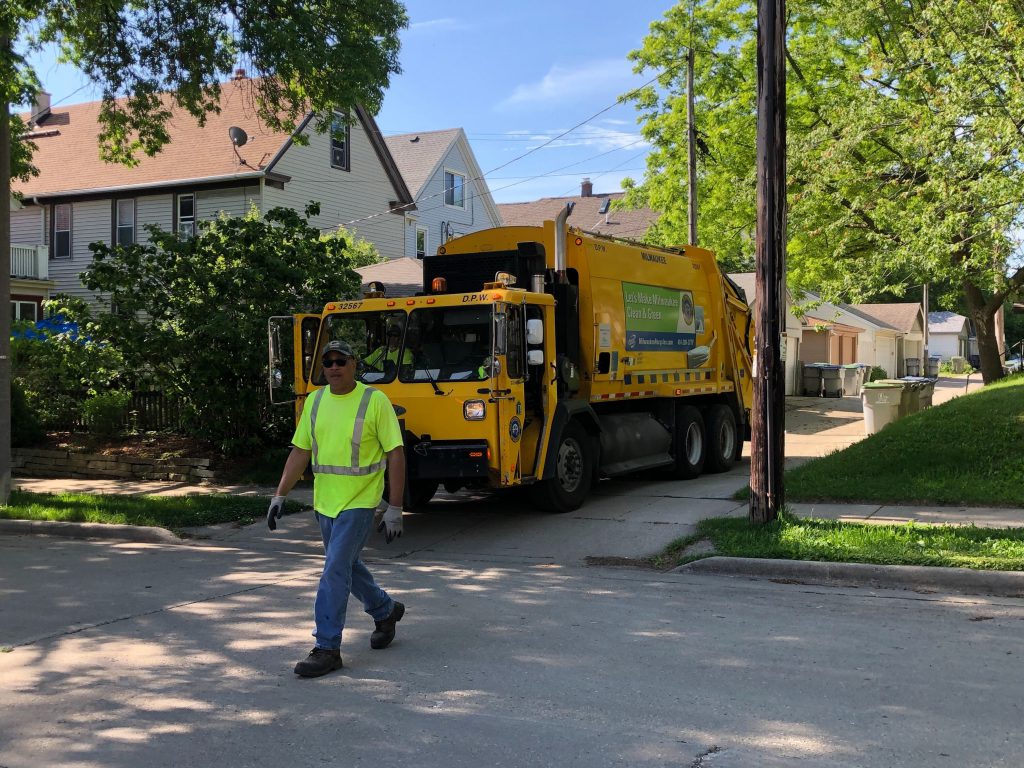DPW To Test Smart Garbage Truck Technology
Could city fleet be used for reporting potholes and illegal dumping? Maybe.
The next time your garbage gets picked up, it could be by a crew using in-cab technology to optimize its route, improve safety and track performance.
The Department of Public Works is engaging in a pilot study to outfit six garbage trucks and four recycling trucks with Rubicon’s smartphone-based SmartCity technology.
“The idea is to use data systems to better and more efficiently manage [our fleet] and provide a greater service level,” said sanitation services manager Rick Meyers on Wednesday morning to the Public Works Committee. “In a nutshell, in the solid waste industry companies are using more and more technologies on the truck.”
The city will deploy the outfitted trucks in an area bounded by W. Center St., Interstate 94, N. 27th St. and the city’s western border.
“We selected that area because it gives us a diversity of service types in terms of front collection, alley collection, dense urban area, different as we get out on the west side,” said Meyers.
He said the system can handle service management, billing, safety, maintenance with the possibility for photos and “exception reporting.”
“Those kinds of are what we want to get more information about,” said Meyers. The city is considering multiple vendors.
“If we have a breakdown, they can assign parts of someone’s route to someone else, it will go right into their portal,” said Meyers of the ability to send new routes to different drivers already on the road.
“If a garbage crew comes to a brush pile, they could hit a button and it would be GPS tracked to the truck,” he said. Depending on the label given, it would be routed to the appropriate department for cleanup.
“Because we have this free pilot, we don’t have the full blown cameras on the dash,” said Meyers. “That’s considerably more expensive.”
Committee chair Robert Bauman was quickly joined by council members Mark Borkowski and Khalif Rainey in asking about the different things that could be identified, possibly automatically, including potholes, stolen cars and crash debris.
“The sky’s the limit in terms of what you can report,” said Meyers.
“Are you intending on being intentional to include those things?” asked Rainey.
“We would also like to identify efficiencies that will help pay for the costs. These are not cheap systems,” said Meyers in explaining the framework.
Jill Price, DPW communication systems manager, said that the technology offerings have improved rapidly. Rubicon is developing a technology to auto-detect potholes according to Meyers.
“This is very interesting,” said Bauman.
While council members increasingly advocate for illegal dumping cleanup, DPW representatives have said the effort is hampered because crews currently rely on a paper-based clipboard system to report issues spotted on the road.
But the trucks are constantly rolling around city streets.
“Our [garbage trucks] are the one category of vehicle that goes everywhere once a week,” said Bauman. “What they see or could see could be immensely valuable.”
The committee unanimously recommended authorizing the pilot study. The full council will review it as a perfunctory measure in two weeks.
Crash Cleanup
While the committee endorsed high-tech garbage trucks, multiple members expressed frustration with debris from vehicle collisions.
Milwaukee Police Department chief of staff Nick DeSiato said the city has received approximately 5,000 reports of vehicle collisions this year, with 2,000 being hit and runs. He said the department just reiterated to officers that they are to report debris to the Department of Public Works for cleanup.
Public Works Commissioner Jeff Polenske said there have been 562 reports of such debris this year, including those that come from citizens.
Rainey led a chorus of council members calling for improved performance.
“I agree with him,” said Bauman.
Polenske said DPW is responding to debris it knows of, but that a number of collisions weren’t reported.
Rainey said DPW cleaning up only what it knows of is a copout. “I am sure there are many employees that are traveling the streets, let’s have them call it in and report back,” said the alderman. “You all don’t want to be responsible for cleaning up.”
The commissioner rejected that reasoning and said existing crews on the street for other purposes don’t have the capacity for more work.
He noted that Ald. Russell W. Stamper, II‘s budget amendment that added a rapid response cleanup team is showing promise.
Rainey and Alderwoman Milele A. Coggs were quick to point out that the department didn’t endorse the idea during the budget cycle.
Meyers said the department did successfully pick up everything reported within a day and half.
“I’m going to do a little experiment and monitor that,” said Rainey.
If you think stories like this are important, become a member of Urban Milwaukee and help support real, independent journalism. Plus you get some cool added benefits.

























“Capacity for more work” sound like a weak excuse but even using the city smartphone app to report a street lighting issue with mapped location and picture took me a couple of minutes , so even that can add up